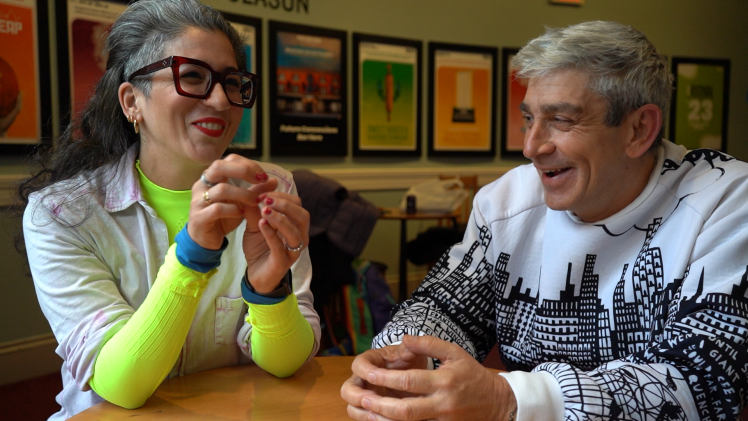Sweet Goats and Blueberry Señoritas, which will debut at Portland Stage this week, is the first play written by poet and memoirist Richard Blanco. He says it was the most challenging thing he has had to do in his life—which is one of the reasons he invited co-writer and fellow Cuban American Vanessa Garcia into the process—but as a longtime explorer of immigration, home, and belonging, he’s also comfortable being a little out of place. Blanco and Garcia had a conversation as they were entering rehearsals.
How would you describe this play to a friend who has not seen it?
BLANCO: This play came about because 15 years ago, my partner, now husband, got a job offer in Bethel and we thought, why not? I had this romantic vision of New England—everyone’s in pilgrim shoes and riding sleighs in the snow. [Laughs] But what I found surprising was that I thought we’d be the odd guys out, but if you’re a good person, a good neighbor, that beats all those cultural differences. I’ve been accepted and become family in a way I never thought. So I wanted to explore the stereotypes that I held.
GARCIA: In the more general sense, this show is about family, chosen and not. It’s about forgiveness being hard and easy. It’s about calling your mother. This show is about what’s fraught and what’s totally not, what’s magic and what’s made into magic. It’s about dance and how cultures merge.
Tell me more about your main character, Beatriz, and how she got here.
BLANCO: Beatriz marries and moves for love, but things don’t pan out and when the play opens, she’s divorced. She’s a little rebellious and that spirit is part of her relationship with her mother, who is still in Miami. Bea opens a bakery as a way of finding her place in the community. It gives her a way to feel grounded, connected. She matters to this place in Maine. So, her dilemma is, should I stay or should I go?
GARCIA: There’s no such thing as universal until there is relativity, relatability, and then we say, “Oh, yeah. I get that. I really get that.” But for that, we must tell our stories. I feel like each of these characters has a whole story, but we are focusing on them through the prism of Bea. If this were a series, we would be able to see each of their routes and prisms. Oh, how wonderful that writer’s room would be!
What is something not seen on stage, but you feel is essential to understanding the show?
BLANCO: Operation Pedro Pan is part of the story’s backdrop—the airlifting of thousands of children out of Cuba, right after the 1959 revolution.
GARCIA: It was the largest exodus of unaccompanied youth in the western hemisphere. Two of our characters were a part of it. I feel blessed for being able to give a tiny glimmer of a glimpse of this huge event that people don’t know about.
What is getting you excited about the performance as you get closer to opening?
BLANCO: Vanessa thinks of ways to connect beyond sitting in the seats, which is what the play is about, having people connect with themselves, and share that connection that they made. I’m really excited to see that happen.
GARCIA: We are asking people to bring objects that matter to them to the theater, objects that remind them of someone they have lost, or someone they need to forgive. They can just hold it or they can even leave them in the theatre under our Cardinal Tree… And you’ll know what that means if you come to the show!
This interview was edited for length and clarity.

Comments are not available on this story.
Send questions/comments to the editors.


